In the Iranian media, referring to the Tajik IS-Khorasan network – Al Azaim, a poster with threats is being distributed in protest against the torture inflicted on terrorists by Russian security forces.
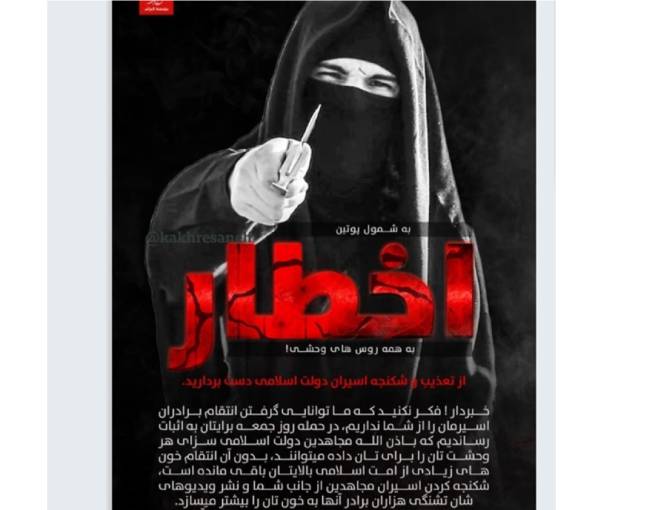
After photos and videos from the courtroom, where the suspects in the attack on Crocus City Hall appeared with signs of brutal torture, one even in a wheelchair, ISIS wants revenge, including threatening Putin personally. Over the past few days, Russian channels have been actively disseminating demonstrations of torture. For example, a photo of Shamsidin Fariduni, who was probably tortured through the genitals with electric shock during his arrest. The circulated photographs show the man lying with his pants down, connected to a military communications device TA-57. Terminals were connected to his genitals and limbs, and water was poured on him to increase the pain. Russian special forces also tortured 30-year-old Tajik Rajab Alizadeh, a suspect in the Crocus massacre, and the story of his cut off ear was actively disseminated online.
Soon a translation of the threatening message appeared on the Internet, although, of course, it is difficult to vouch for its authenticity. “To all the wild Russians, in particular Putin! Beware!” – it is said in the terrorists' leaflet-poster.

The court sent to pre-trial detention four citizens of Tajikistan suspected of the terrorist attack, who are accused of killing more than 130 people. They will remain there until May 22.
The actions of Russian law enforcement officers seriously angered the terrorist group ISIS, Iranian media reported, and the terrorists announced further terrorist attacks on Russian territory. ISIS statements are confirmed by other resources close to the organization. According to them, representatives of ISIS will “become even more dangerous” due to “videos showing torture” against detained suspects. In particular, the terrorists allegedly plan to avenge their “brothers”: “Expect very heavy, deadly, bloody, painful, hellish and destructive blows. Very soon!”
Meanwhile, the US State Department again warned its citizens located in Russia about the threat of terrorist attacks in the Russian Federation – a statement with recommendations was made public on March 23. The State Department urged American citizens to leave the country as soon as possible. Let us recall that Washington issued a similar warning shortly before the terrorist attack committed at Crocus City Hall. And on March 24, German Interior Minister Nancy Feser also warned of an acute threat from Islamist terrorists. writes publication “Correspondent”.
Despite the rhetoric of the head of the Kremlin aimed at the involvement of Ukraine in the terrorist attack in Crocus, analysts, former US security officials and representatives of the Russian elite stated for The Washington Post that the attack highlighted the vulnerability of the Russian regime. Senior Research Fellow at the Carnegie Russia Eurasia Center Andrey Kolesnikov says: “The regime demonstrates its weakness in such critical situations as it was during the Prigozhin rebellion.” Prigozhin abandoned the uprising, but the consequences were obvious. Just as during the latest events in Crocus, the President of the Russian Federation did not comment on the situation for almost a day. Kolesnikov notes: “In difficult moments, Putin always disappears.”
A Russian academic with close ties to senior Moscow diplomats noted that Russian security services have invested enormous resources in monitoring the situation with protests during the elections or those who laid flowers in honor of Alexei Navalny. However, ensuring that citizens are adequately protected from threats posed by known terrorist groups has moved up the list of priorities. On condition of anonymity, the academician said:
“It is clear that we will look for Ukrainian fingerprints and possibly Western intelligence services. But any investigation is likely to reveal the failures of our security services.”
Let us recall that shortly after the terrorist attack on the Crocus City Hall concert hall in Moscow on March 22, a branch of the so-called “Islamic State”, calling itself the “Islamic State of Khorasan Province” (IS-K, also known as “Vilayat Khorasan”), took over responsibility for the bloody terrorist attack. The statement was published through the IS-affiliated news agency Amaq and distributed via Telegram. writes D.W.
IS-K is considered one of the most brutal offshoots of the Islamic State. Since 2015, the transnational jihadist terrorist group has killed thousands of people in attacks in Afghanistan and Pakistan. The group's name comes from Khorasan, an ancient region spanning parts of what is now Iran, Turkmenistan and Afghanistan, although the terrorists' activities extend beyond that territory. IS-K was founded in Pakistan and Afghanistan in 2014 by defectors from the Taliban and al-Qaeda, and adheres to a militant interpretation of jihadism. In 2015, the group officially named itself the IS branch in the Khorasan region. Like IS, IS-X seeks to create a transnational caliphate – a state for Muslims, governed according to its own radical interpretation of Islam.
After its recent strengthening, ISIS is increasingly turning its attention to Russia. In March, representatives of American intelligence agencies reported that the group is actively operating in the Russian Federation and is developing plans for terrorist attacks in Moscow. The Russian FSB said that on March 7 it prevented an armed attack by group militants on a synagogue in the Kaluga region.
According to experts, one of the motives of terrorist attacks ISIS in Russia may be Moscow's intervention in the Syrian civil war. The Russian Federation supported Syrian President Bashar al-Assad and carried out airstrikes against IS positions in this country. After this, many IS leaders condemned Putin as a leader who, they say, has the blood of Muslims on his hands. In addition, in its propaganda materials, IS-K refers to the history of the Soviet invasion of Afghanistan, which lasted from 1979 to 1989.
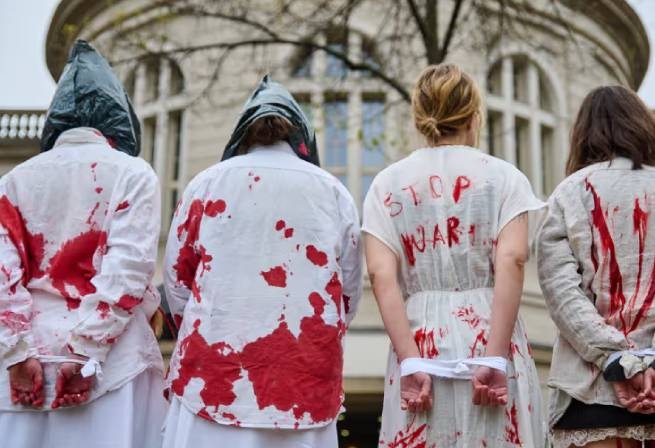

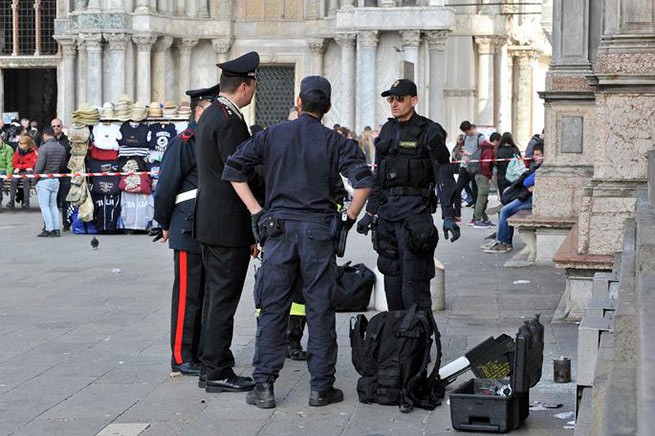

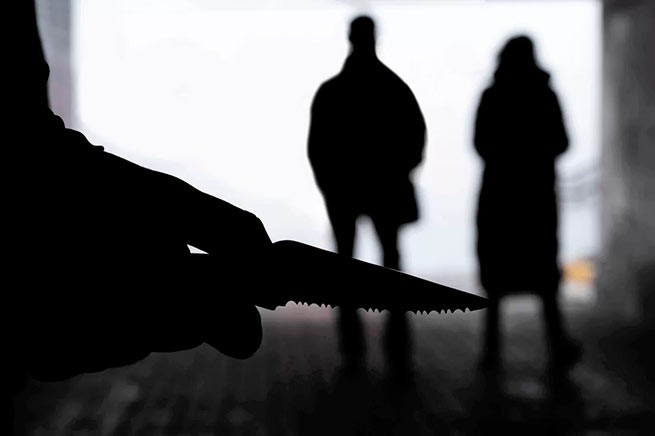
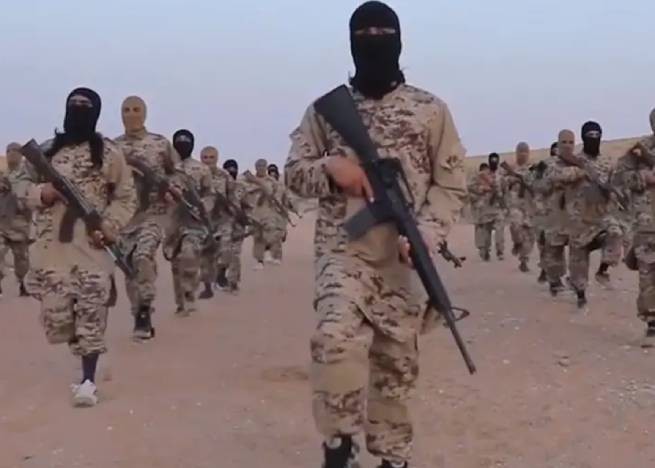

More Stories
IMF: "Huge US debt poses serious risk to global economy"
Teenager arrested in Paris: he wanted to “die as a martyr” at the Olympic Games (video)
The European Parliament adopted a resolution on non-recognition of the legitimacy of the Russian president